
Liesje Schreinemacher, minister for foreign trade and development cooperation of the Netherlands.
Photo: Ministerie van Buitenlandse Zaken, CC BY-SA 2.0 via Wikimedia Commons
The Dutch trade minister defended her country’s bilateral relationship with China this week stating in an interview with the Financial Times that a potential schism with China jeopardised Europe’s entire green transition.
Liesje Schreinemacher urged caution regarding any EU plans to completely disentangle from China, saying that a working relationship with Beijing is vital to making the European economy more sustainable.
Schreinemacher’s comments are a mild break from the Dutch government’s usually hawkish commitment to mitigate Chinese influence, as EU leaders ponder whether to follow the U.S. lead on severing economic ties with China on national security grounds.
China’s strategic hold over the green economy has put European lawmakers up against a wall in recent months, as American green subsidies have prompted a surge in electric car manufacturers offshoring production away from the EU.
Schreinemacher cautiously backed increased screening of Chinese investments but was clear that reducing dependency on China did not necessarily entail ceasing trade and cooperation entirely. Schreinemacher also asserted that European nations ought to have the final say on security matters, in the face of American pressure for Europe to disengage with China.
The remarks come after G7 leaders agreed to take a more adversarial stance against Chinese economic expansionism earlier this month, with the Netherlands spearheading an embargo on exports of strategically vital semiconductors to China.
Schreinemacher confirmed the Dutch government’s intention to lobby fellow EU nations to expand her nation’s semiconductors restrictions, seen as essential for the development of green technology.
The Chinese ambassador to the EU, Fu Cong, welcomed the remarks, tweeting his support of Schreinemacher’s commitment not to burn bridges with China entirely. Fu recently warned against the prospect of an EU-Chinese trade war as he played down the potential of Europe becoming a Chinese economic vassal in an interview with the British New Statesman magazine.
Totally agree with the objective & rational view of Mme Liesje Schreinemacher, Minister for Foreign Trade and Development Cooperation of the Netherlands🇳🇱.
— Fu Cong 傅聪 (@FuCong17) May 29, 2023
“Europe’s green transition will be impossible without China🇨🇳. We need each other when it comes to making our economies… pic.twitter.com/3uI9UaVmRP
The Dutch Foreign Minister highlighted similar security concerns in bilateral talks with Chinese leadership this week with the Netherlands being a crucial nation in global semiconductor production.
Dutch exports to China amounted to $15.35 billion last year. Heavy investments by Chinese firms in Dutch wind and electric car infrastructure have prompted fears that Beijing could hold the whip hand over the Dutch and European economies.
Brussels is scrambling to strike the right balance in a brewing U.S.-Chinese trade war. EU Commission President von der Leyen and President Macron have both advocated third-way options for Europe against total economic isolation from China. The bloc unveiled protectionist measures designed to safeguard the European green economy against Chinese overdependence. The measures include new regulations on raw materials and the use of Chinese components.
The EU’s foreign policy chief Josep Borrell outlined his belief that European economic integration with China would need to be reassessed and scaled back in light of growing concerns, as he castigated China for its role in Russian military operations in Ukraine.
